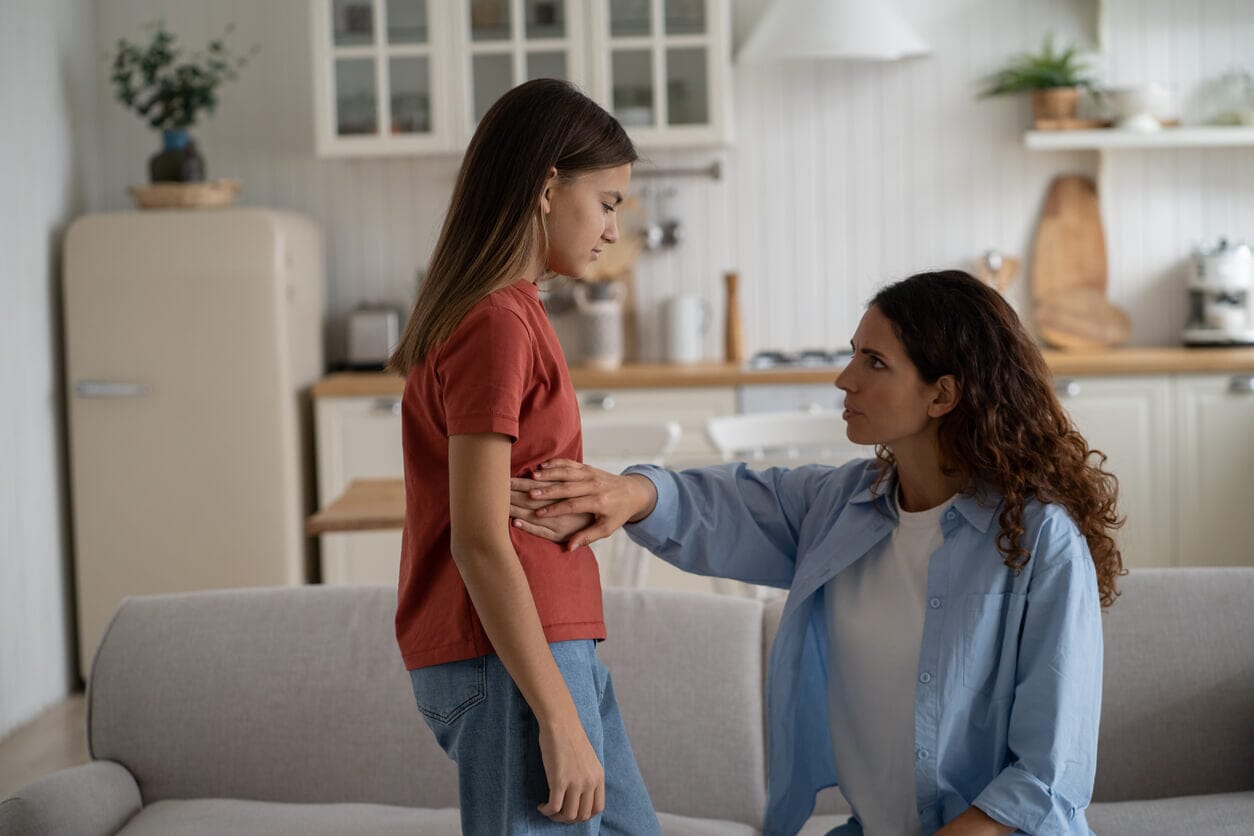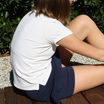Recognizing the Signs of Your First Period

Starting your period is a normal part of every girl’s life, but it can be quite terrifying at first. This is especially true if you are not aware of the signs of the first period, which can then make the entire experience even more confusing.
According to the Cleveland Clinic [1], the average age for periods begins at about 12 years, but it can also happen that girls experience it for the first time anywhere between the ages of 8 and 16. And although this is completely normal, that doesn’t make it less scary if it’s happening to you for the first time.
Luckily, Bleuet is here to help. We’re about to go over all of the signs of your first period coming, explain what to look out for and how to deal with all of the changes happening.
The signs of your first period include:
- Mood swings
- Acne
- Bloating
- Fatigue
- Tender breasts
- Abdominal cramps
- Backaches
- Diarrhea
- Discharge
- Headache
- Joint pain
Now, let's take a look at this in detail.
1. Mood swings

Even though periods are oftentimes accompanied by mood swings, these alone don’t necessarily need to be telltale signs your period is coming for the first time. However, if you notice that you’re feeling extra moody and irritable for a few days in a row – often without any clear reason, it may be a good time to start preparing to meet Aunt Flo for the first time.
How to deal with it: Dealing with mood swings can be somewhat tricky as you may not be aware that you’re experiencing them at the moment. That’s why you should consider keeping a journal where you can note down all of your emotions and see how you’ve managed to handle them.
2. Acne

Acne is another clear sign that your body is going through hormonal changes [2], which are often caused by the onset of a period. Just before you get your period, your estrogen and progesterone levels will drop, which will cause your sebaceous glands to produce more sebum (an oily substance you can feel on your skin). This can then lead to clogged pores and breakouts, which are usually the initial signs of getting your first period.
How to deal with it: Proper skin care and good hygiene are often not enough to get rid of period-induced acne, so it would be best to consult a skincare professional. Of course, make sure you clean and moisturize your face regularly, but don’t overdo it during your period, as this can sometimes cause more harm than good [3].
3. Bloating

Again, the shifts in your estrogen and progesterone levels [4] cause your body to retain more water, which causes you to look and feel bloated. The good news is that this is completely normal and bloating should go away in a couple of days naturally.
How to deal with it: As much as bloating is natural during periods, it can get quite uncomfortable. So, to minimize the impact, you can try avoiding salty, overly-processed and greasy foods, drinking more water and eating more foods rich in potassium. Potassium is known to regulate your body’s sodium levels, which will reduce unnecessary water retention and thus minimize the bloating you may experience.
4. Fatigue

The dips in estrogen levels can also lead to feeling fatigued, which is why you may notice that you’re feeling more tired than usual right before your period starts. And although this feeling won’t go away as soon as you start menstruating, things should go back to normal in a few days as your estrogen levels start to go back up.
How to deal with it: The best way to deal with fatigue is to make sure you get enough sleep. In general, tweens and teens require more sleep (eight to 10 hours) [5] as their bodies are going through significant changes during this period. What’s more, make sure you stay well hydrated and do some light exercises to fend off the feeling of tiredness.
5. Tender Breasts

Once your breast tissue begins to develop, you can expect that your period will be close to follow. But if you notice that your breasts feel extra sensitive, “heavy,” a bit bigger than usual and sore, you can expect to start your period in a few days. This tenderness is, once more, caused by hormonal changes, so it should go away once your hormone levels return to their usual state.
How to deal with it: The key to minimizing the feeling of breast tenderness is to find a good training bra that will provide the necessary support without irritating you even further. So, if you find that wearing your current bras while on your period feels super uncomfortable, it’s time to go bra shopping and find something with minimal seams and no tags to improve comfort.
6. Abdominal Cramps

The pain in your lower abdomen, also known as abdominal cramps, happens because during your period, your uterus – which is made of muscle tissue – will start to contract in order to “push” your period out. As fascinating as this entire process is – it can also get quite painful and uncomfortable.
How to deal with it: Over-the-counter medicine, heating pads and light exercise can help mitigate the pain. You can also take warm showers more frequently if you feel like they help, and try light circular belly rubs.
7. Backaches

It is also quite common that you experience lower back pain before you get your first period. This is mostly due to the fact that the pain you feel from your abdominal cramps can “reflect” into your lower back. However, if the pain doesn’t go away in a few days or if it’s severe, you should definitely go see a doctor.
How to deal with it: Similar to abdominal cramps, backaches can also be minimized with some light massages, warm showers, heating pads and light exercise. You can also use some age-appropriate over-the-counter pain medicine, but it’s super important that you consult your doctor prior to using them.
8. Diarrhea

Aside from estrogen and progesterone, our bodies also contain prostaglandins [6], which are hormone-like substances that control several functions in our bodies, and bowel movement is one of them. Before our period starts, prostaglandin levels rise, which causes our bowels to contract and our stool to become looser and more frequent.
How to deal with it: Since prostaglandins are produced from omega-3 fatty acids, it’s good to include more food rich with these acids – like salmon, leafy vegetables and nuts – in your diet. You should also increase your fiber intake and avoid consuming foods that can trigger diarrhea, such as greasy, spicy and sugary foods.
9. Discharge

Vaginal discharge is normal and it serves the purpose of keeping your vagina healthy. However, once your period is about to start, you may notice some changes in the texture and color of your discharge. It will become thicker and darker than usual as it gets mixed with your period.
How to deal with it: Since pre-menstrual discharge is completely normal, there’s no reason to try and minimize it. What you can do, however, is start wearing panty liners to avoid potentially staining your clothes and always have an extra pad or two in case pre-menstrual discharge turns into a period.
10. Headache

Just like with many previous points, headaches also happen during periods due to hormonal changes. Since fluctuating estrogen levels make us more sensitive to pain [7], it’s quite common that you experience headaches before you get your period.
How to deal with it: The easiest way to deal with period headaches is to take some age-appropriate over-the-counter pain medicine (like ibuprofen) and use heating or cooling pads - depending on which of these feel better at the moment. You should also minimize exposure to light, strong smells and sounds, as these can easily trigger headaches.
11. Joint Pain

As mentioned earlier, when your estrogen levels are low, your body will have a more difficult time retaining water. And since normal estrogen levels drop significantly when you’re on your period, it’s quite common that you start experiencing joint pains due to the fact that there’s not enough hydration in your organism at that time to keep your joints properly lubricated.
How to deal with it: To deal with joint pain, you need to make sure that you drink plenty of water and stay well hydrated throughout the day. Additionally, you can try light stretching exercises, warm showers and light massages to ease the pain.
How to Prepare for Your First Period

Now that you’ve learned more about what are the signs of getting your first period, it’s time to talk about how you can prepare to welcome it. Generally speaking, although you may feel like you’re well-informed about what to expect with your first period and how to recognize these signs, your first period may still catch you off guard.
That’s why you should pack a small “emergency” bag – with a pair of clean underwear, wet wipes and a few pads – and always carry it in your bag. That way, if you do end up getting your period while you’re not at home, you can still take control of the situation and get yourself cleaned up.
Moreover, make sure you talk with women in your life and let them help you prepare for this transformative period. Besides, they are the ones who’ve already experienced the same thing that’s about to happen to you, so they’ll be able to offer plenty of practical advice.
Who You Can Talk to About Your First Period

Talking about your first period may be as awkward as the experience itself, but keep in mind that many women have gone through the same thing. So, try talking to your mom, older sister, aunt, grandma or any other woman you feel close to.
If, on the other hand, you don’t have any woman in your life you feel like you can turn to, you can also talk to your dad. If he’s not able to help offer advice, or simply doesn’t feel comfortable enough to talk to you about it, you two can always work together on finding a doctor or other type of professional that can help guide you through the experience.
The most important thing to remember is that the people in your life who are close to you and mean you well are always there to help, so don’t hesitate to come to them with any problem, question or concern you may be having.
Other Things You Need to Know About Your First Period

Your first period will be a sign that you’re no longer a little girl and that your body is starting to mature. After your first period, you can expect the same process to repeat every 21-35 days. Normal periods generally last anywhere between three to seven days, and each next period that you experience will be easier to handle than the previous one, as you’ll gain more experience and knowledge about how to deal with them.
Additionally, since you’re now slowly becoming a woman, it’s important to understand that this also means that you can potentially become pregnant. That’s why it’s extremely important that you have a conversation about this topic with an experienced adult.
It’s also important to mention that the first few periods don’t necessarily need to look and feel the same. You may experience breast tenderness the first time, but not the next time. You may also miss your next period, or it may look and feel entirely different than your first one.
So, if you ever have any questions or concerns about any changes happening to you and your body, make sure you talk to someone – more experienced than you – about them.
Find Your Perfect First Bra at Bleuet

Here at Bleuet, we specialize in creating bras for developing young girls. Our main focus is on functionality and comfort, which is why we’ve developed minimal-stitch and tag-free everyday bras just for you! Our bras are created to provide comfort and support, and make every girl’s transitioning process from childhood to womanhood feel as cozy as possible. With our reversible bras, you will certainly find what you’re looking for, so check out our size guide and find your perfect first bra!
Conclusion
Getting your first period is a huge milestone in your life that marks the beginning of your physical and emotional maturation. But in order to prepare for this transition, you should first learn what are the signs of your first period, so that you can recognize them.
The most common signs of the first period usually include mood swings, physical discomforts like bloating, breast tenderness, abdominal cramps and headaches, but - as mentioned previously – you don’t necessarily have to experience all of these before your first period.
So, in order to be prepared to welcome Aunt Flo for the first time, make sure you keep essential hygiene items handy, seek advice from trusted people in your life and never hesitate to voice your questions or concerns. By staying informed and seeking support when needed, you can easily navigate this milestone with the grace and empowerment that you deserve.
Frequently Asked Questions
What are the symptoms before a girl's first period?
The most common symptoms many girls experience before they get their first period include cramping in the lower abdomen, lower back and legs, bloating, breast tenderness, acne breakouts, mood swings and fatigue. Some girls also report feeling nauseous and experiencing headaches.
How do you know if your daughter is about to start her period?
If you’re a woman, chances are you’ll pretty easily notice if your daughter is about to get her first period. Mood swings, emotional outbursts, food cravings and acne outbreaks are just some of the most common signs of an upcoming period. If you’re not a woman, on the other hand, it may be a bit more difficult to recognize that your daughter is about to start her period for the first time. So, keep an eye out for the telltale signs in order to be able to offer help and guidance when the time comes.
What will your first period look like?
Your first period may surprise you, even though you will most likely experience at least some of the symptoms. But don't worry. During your first period, you can expect to feel physical discomfort, like stomach and back pain, headaches and joint pain, frequent mood swings and fatigue. Your period will also likely last anywhere between three to eight days, and you can expect period flow that can range from light brownish or reddish spots to a heavier flow.
References
[1] https://my.clevelandclinic.org/health/articles/10132-menstrual-cycle
[2] https://flo.health/menstrual-cycle/health/period/hormone-levels-during-cycle
[3] https://www.aad.org/public/diseases/acne/skin-care/habits-stop
[4] https://www.medicalnewstoday.com/articles/319579
[5] https://www.cdc.gov/healthyschools/features/students-sleep.htm
[6] https://my.clevelandclinic.org/health/articles/24411-prostaglandins









Leave a comment